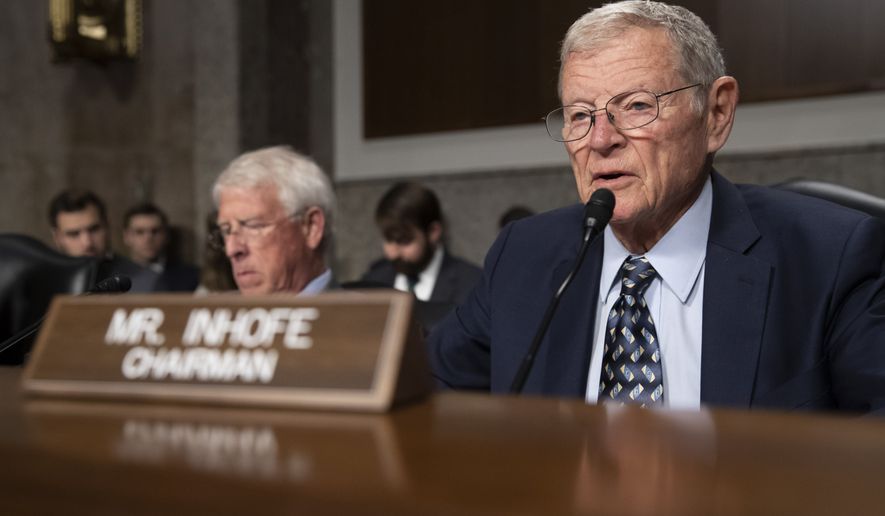Congressional negotiators face a make-or-break weekend to nail down a major defense policy and spending bill by Monday’s deadline to vote before the looming holiday recess.
Despite sometimes contentious talks, leading House and Senate lawmakers expressed confidence Thursday that they would come to an agreement on the annual National Defense Authorization Act after months of partisan sparring that has ignited questions of whether Congress will pass the legislation by the end of the year.
The massive bill, which sets budget levels for the Pentagon and weighs in on a host of military and security policy issues, has become a test of Capitol Hill’s ability to move major legislation in the midst of a drive to impeach President Trump. Despite all the clashes of the past six decades, Congress has managed to pass a National Defense Authorization Act for the past 58 years.
“It is very much possible that by the end of today we will have an agreement,” House Armed Services Committee Chairman Adam Smith, Washington Democrat, said at an event Thursday morning hosted by the American Enterprise Institute.
He later confirmed to The Washington Times that the four leaders of the House and Senate armed services committees would meet Thursday evening to try to wrap up a deal.
Senate Armed Services Committee Chairman James M. Inhofe, Oklahoma Republican, has in the past raised the prospect that lawmakers will have to settle for a “skinny” authorization act, without resolving many of the most divisive issues.
Mr. Smith has repeatedly expressed optimism that a deal was within reach.
“We have until Monday,” he said. “I’m hoping to do it before then, but if not then I’m reasonably confident unless someone drops a bomb — which is always possible — that we will get to it today.”
Traditionally a bipartisan exercise, the National Defense Authorization Act has been caught up this year in the polarizing fight over Mr. Trump’s fate.
The eleventh-hour negotiations have coincided with the House impeachment inquiry, which has led to Republican charges that Democrats have been “distracted” by the hearings and failed to address major legislation on trade, spending, immigration and defense.
Mr. Inhofe rejected the idea that the impeachment fight will delay a vote and said the two matters are unrelated. But Defense News reported that the Republican chairman talked this week with Mr. Trump and Defense Secretary Mark T. Esper about the state of the bill without getting a clear administration signoff.
“We have a couple of obstacles that are left that are there now that weren’t there yesterday, and I, obviously, am not going to talk about it,” he told reporters as he proceeded to Thursday floor votes.
Blocked by a wall
Lawmakers have been at odds over several key issues that have delayed negotiations for the final bill, including language on the U.S. military’s role in Yemen’s brutal civil war and funding for Mr. Trump’s proposed Space Force.
The biggest hang-up: whether and how to fund Mr. Trump’s Mexico border wall. Republicans have argued that construction of the wall is a national security issue and warrants funding from the Defense Department’s budget.
Democrats strongly disagree and said this week that they have kept the fight over wall funding out of the National Defense Authorization Act.
“This should not be part of the Pentagon’s core mission, either taking money out of [the military construction fund] or out of DoD to build it, or taking personnel and putting them out there as their primary task,” Mr. Smith said. “It does ultimately hurt their mission.”
Democrats have been unwavering in their stance that no Pentagon funds should be used for the wall or to provide troops to back up Customs and Border Protection agents deployed near Mexico.
The impasse contributed to several key missed deadlines and led to the need for stopgap spending bills for the military. The latest expires on Dec. 20. Pentagon officials fear a breakdown in the talks could result in the delay or cancellation of major spending increases in Mr. Trump’s defense budget submission.
Another key issue that has long held up negotiations is whether transgender personnel should be allowed to serve in the military. Mr. Trump banned transgender troops from the ranks early in his administration, but Democrats suggest they lost that debate.
“We fought hard for it,” Mr. Smith said. “There should be no restriction on transgender troops to serve.”
Mr. Inhofe sounded less certain than his House counterpart about the prospects for a breakthrough by Monday.
He remained silent on the specifics, as did Mr. Smith. Mr. Inhofe said that if the issues became public, they would “kill any chance we have of getting it done.”
“There have been like 15,000 hiccups,” Mr. Smith joked to reporters after votes Thursday. “There have been a bunch of hiccups, and we’re working our way through all of them.”
The big problem, he said, “is people finding out they didn’t get what they wanted and find some last, desperate way to get what they want.”
If lawmakers do not agree on a final text for the bill or fail to vote before the holiday recess, the impasse could lead to a stopgap defense spending bill for the entire 2020 federal fiscal year. Lawmakers and the Pentagon’s top brass have warned against that scenario.
• Lauren Toms can be reached at lmeier@washingtontimes.com.




Please read our comment policy before commenting.